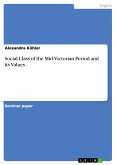Seminar paper from the year 2012 in the subject Didactics - English - Grammar, Style, Working Technique, grade: 1,0, Humboldt-University of Berlin, language: English, abstract: Since English and German belong to the West Germanic family, both languages are - considered from a historical perspective – closely related. However, English and German have developed in entirely different ways over time. While English was strongly influenced by many foreign languages, such as French, German remained closer to the language group both originally derived from. Precisely these divergent developments make a contrastive analysis between the two major languages particularly interesting. Within this paper, English and German will be compared with regard to the passive voice, one form of the grammatical category voice that is, according to König & Gast (2009: 123), easy to identify in English and German and rather unproblematic to compare. In its general meaning, the term voice is used interchangeably with diathesis. In this sense, the concept of voice relates to the argument structure of predicates, i.e. the relationship between thematic roles like Agent, Patient, Instrument and grammatical functions like subject and object, as well as to the alternations found between different argument structures. (ibid.). While diathesis appears to be a characteristic of any verb, voice - in the more restricted understanding of the word – “means the form of a [...] verb which shows whether the person or thing denoted by the subject acts or is acted upon” (Xavier 2008: 50). The narrower concept of voice, thus, differentiates between the active and the passive. In the course of my studies, the grammatical phenomenon of voice has been used several times to exemplarily compare English with German. The system of voice in English and German has been (re-)introduced in the course of this semester´s seminar English in Contrast. Therefore, my interest in this topic was already raised before the seminar and I found it particularly interesting to learn more about the differences of English and German passives. As a future teacher of both of these major languages, I consider this an excellent opportunity to gain a detailed inside into this matter. This term paper aims at figuring out in how far the passive voice is different in English and German. Despite both languages` very same origin, it is assumed that, due to language change, English and German show considerable differences in the passive voice. The work by König & Gast (2009) will be taken as the basis for a discussion on this question...









